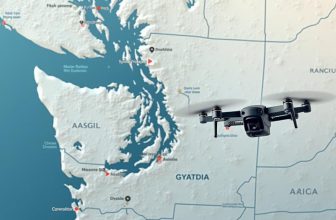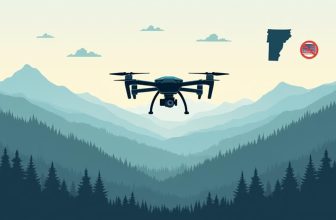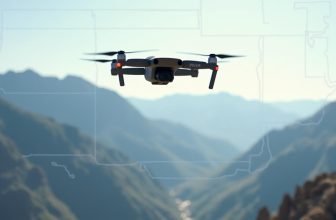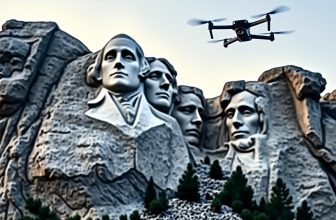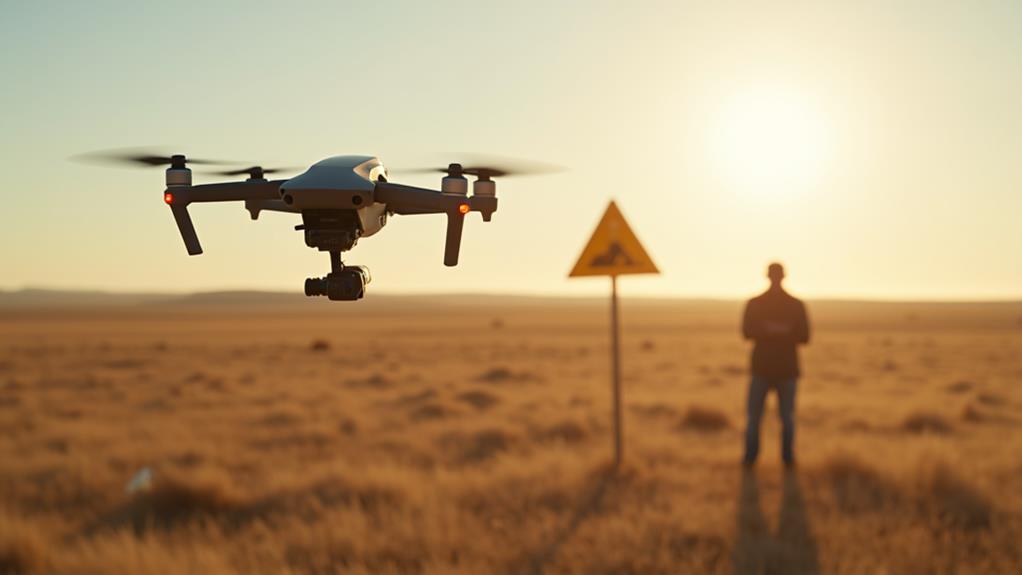
You might think that flying a drone in Oklahoma is as simple as taking it out of the box and hitting the skies, but the truth is that there are several laws and regulations in place to safeguard and promote responsible drone operation. As a drone operator, you'll need to navigate a complex web of federal and state laws, including those related to registration, airspace, and commercial use. Understanding these laws is vital to avoiding fines, penalties, and even imprisonment. But where do you even start? Oklahoma's drone laws cover a range of topics – let's take a closer look.
Contents
- 1 Key Takeaways
- 2 Recreational Drone Use Rules
- 3 Commercial Drone Operation Laws
- 4 Registration Requirements
- 5 Right to Privacy Laws
- 6 State Park Drone Restrictions
- 7 Airspace Restrictions
- 8 Prohibited Drone Activities
- 9 Law Enforcement Drone Use
- 10 Penalties for Non-Compliance
- 11 Frequently Asked Questions
- 12 Conclusion
Key Takeaways
- Register drones weighing between 0.55 and 55 pounds with the FAA for a valid registration period of three years.
- Obtain a remote pilot certificate with a small UAS rating from the FAA for commercial drone operations in Oklahoma.
- Follow Oklahoma's laws recognizing individuals' reasonable expectation of privacy, and avoid capturing images or videos without consent.
- Familiarize yourself with Oklahoma state park drone regulations, permitted areas, and restricted zones before flying a drone.
- Law enforcement agencies in Oklahoma can use drones for search and rescue, crime scene investigations, and surveillance with a warrant or probable cause.
Recreational Drone Use Rules
When operating a drone for recreational purposes in Oklahoma, caution is key to avoiding fines and guaranteeing safety.
You must adhere to specific Drone Safety Tips and Airborne Etiquette guidelines. According to the Oklahoma Department of Transportation, you must register your drone if it weighs between 0.55 and 55 pounds and is used for recreational or commercial purposes.
You can only fly your drone in Class G airspace, which is generally below 1,200 feet above ground level.
You must maintain visual line-of-sight contact with your drone at all times and avoid flying in restricted areas, such as near airports, national parks, and military bases. Additionally, you can't fly over people or in areas with temporary flight restrictions.
You must follow right-of-way rules and yield to manned aircraft, such as planes and helicopters.
Avoid flying near emergency responders, such as firefighters and police officers, and never interfere with their operations.
Commercial Drone Operation Laws
Operating a drone for commercial purposes in Oklahoma requires adherence to a more stringent set of regulations than recreational use.
You'll need to guarantee compliance with federal and state laws to avoid fines and penalties.
As a commercial drone operator in Oklahoma, you'll need to meet specific requirements to operate safely and effectively.
Some key deliberations for commercial drone operation in Oklahoma include:
- Pilot certification requirements: You'll need to obtain a remote pilot certificate with a small unmanned aircraft systems (sUAS) rating from the Federal Aviation Administration (FAA) to operate a drone for commercial purposes.
- Drone insurance options: You'll need to weigh liability insurance to protect yourself and your business in case of accidents or property damage.
- Airspace restrictions: You'll need to be aware of restricted airspace, such as near airports or in national parks, and obtain necessary waivers or authorizations to operate in these areas.
- Right-of-way rules: You'll need to be aware of right-of-way rules and yield to manned aircraft to guarantee safe operation.
Registration Requirements
When operating a drone in Oklahoma, you must register your device with the Federal Aviation Administration (FAA) if it meets certain weight and operational requirements.
For recreational drone operators, registration is required for drones weighing between 0.55 and 55 pounds that are flown for hobby or recreational purposes.
Commercial drone operators, on the other hand, must register their drones as part of their commercial operation requirements, regardless of the drone's weight.
Recreational Drone Registration
To register your drone for recreational use in Oklahoma, you must comply with the Federal Aviation Administration's (FAA) requirements.
As a drone enthusiast, it is vital to understand the rules and regulations governing recreational drone use. Failure to register your drone may result in penalties and fines.
The FAA requires registration for drones weighing between 0.55 pounds (250g) and 55 pounds (25kg) used for recreational purposes.
You must be at least 13 years old to register a drone, and you can only register drones you own.
Some key points to bear in mind when registering your recreational drone include:
- Registration is required if your drone weighs between 0.55 pounds and 55 pounds.
- You must be at least 13 years old to register a drone.
- You can only register drones you own.
- Registration is valid for three years.
Recreational drone clubs and drone enthusiast communities often provide guidance on registration and other regulations.
Imperative to stay informed about Oklahoma drone laws and FAA requirements to guarantee safe and responsible drone operation.
Commercial Drone Registration
If you plan to use your drone for commercial purposes in Oklahoma, you'll need to comply with the Federal Aviation Administration's (FAA) registration requirements, which differ from those for recreational use.
Commercial drone registration is mandatory for unmanned aircraft systems (UAS) weighing between 0.55 and 55 pounds that are used for business purposes.
You'll need to register your drone online through the FAA's UAS registration system and pay a fee of $5 per drone.
You'll also need to provide your name, email address, and physical address.
Additionally, you'll need to mark your drone with its registration number.
To operate a commercial drone, you'll also need to obtain a remote pilot certification with a small UAS rating.
You can pursue various pilot certification paths, such as taking an online course or attending a training program.
Moreover, it's recommended that you consider drone insurance options to protect yourself and your business from potential liabilities.
The FAA requires you to maintain liability insurance that covers damages to people and property.
Right to Privacy Laws
Operating drones in Oklahoma may raise concerns about individual privacy.
As a drone operator, you must be aware of the state's laws and regulations regarding privacy expectations and surveillance concerns. Oklahoma's laws recognize that individuals have a reasonable expectation of privacy, which may be breached if you use your drone to capture images or videos of people or property without their consent.
Some key considerations to keep in mind:
- Oklahoma's video voyeurism law prohibits the use of drones to capture images or videos of people in private areas without their consent.
- You may be liable for damages if you use your drone to capture images or videos of people or property without their consent.
- Oklahoma law enforcement agencies have the authority to use drones for surveillance purposes, but must comply with strict guidelines and regulations.
- You should always be mindful of your surroundings and guarantee that you aren't violating anyone's privacy expectations when operating your drone.
As a responsible drone operator, it's essential to respect individuals' privacy expectations and adhere to the state's laws and regulations regarding surveillance concerns.
State Park Drone Restrictions
When flying a drone in Oklahoma state parks, you'll need to familiarize yourself with permitted park areas where drone operations are allowed.
Conversely, certain zones within these parks are restricted to drone flights, and understanding these no-fly areas is vital for compliance.
Being mindful of the specific park rules and regulations that govern drone enforcement within these designated areas is paramount.
Permitted Park Areas
Oklahoma State Parks have designated areas where you can fly drones, but you must follow specific guidelines to avoid restrictions.
Before flying, you must acquaint yourself with the park's rules and regulations. You can obtain this information by contacting the park directly or checking with Park Rangers.
Some parks have designated drone flying areas, while others may have specific restrictions or prohibitions.
It's vital to respect these regulations to avoid disrupting the natural environment and other park visitors.
- Drones aren't allowed in Wilderness Areas or other sensitive habitats.
- You must maintain a safe distance from other park visitors and wildlife.
- Keep your drone in sight at all times and be aware of your surroundings.
- Follow the park's noise restrictions and guidelines for drone operation.
Restricted Flight Zones
State park drone restrictions in Oklahoma designate specific areas as "no-fly zones," which you must avoid to prevent disruptions and guarantee park safety.
These no-fly zones typically include sensitive or restricted areas, such as areas with sensitive wildlife habitats, archaeological sites, and areas near dams or other critical infrastructure.
When planning your drone flight in Oklahoma state parks, you must research restricted areas beforehand to verify you comply with the regulations.
You can find this information on the Oklahoma State Parks website, the Federal Aviation Administration (FAA) website, or through the B4UFLY app.
Additionally, you must be aware of airspace restrictions, such as Temporary Flight Restrictions (TFRs), that may impact your drone flight.
These restrictions can be put in place for various reasons, including national security concerns and to protect air traffic.
Always check for TFRs and other airspace restrictions before flying your drone in Oklahoma state parks to avoid violating federal regulations.
Park Rules Enforcement
Enforcement of park rules related to drone use in Oklahoma state parks is typically the responsibility of park rangers and other authorized personnel.
These individuals are tasked with ensuring that drone operators comply with state park regulations, which may include restrictions on drone use in certain areas or during specific times.
To effectively enforce these regulations, park rangers often conduct drone patrols, which involve monitoring drone activity within the park.
If a drone operator is found to be violating park rules, they may be subject to fines, penalties, or even confiscation of their drone.
Some key things to keep in mind when flying a drone in Oklahoma state parks include:
- Obtain permission: You may need to obtain permission from park authorities before flying a drone.
- Follow posted signs: Pay attention to signs indicating drone-restricted areas or times.
- Keep a safe distance: Maintain a safe distance from people, wildlife, and park features.
- Respect wildlife: Avoid disturbing or harassing wildlife with your drone.
Airspace Restrictions
Several airspace restrictions apply to drone operations in Oklahoma. You must verify your drone complies with these restrictions to avoid interfering with manned aircraft and other aerial operations.
No Fly Zones are designated areas where drone operations are prohibited due to national security concerns or other safety risks. You can find No Fly Zones on the Federal Aviation Administration's (FAA) B4UFLY mobile app or on their website.
Additionally, you must contact Air Traffic Control (ATC) if you plan to operate your drone within five miles of an airport or in Class B, C, D, or E airspace. ATC will inform you of any airspace restrictions or requirements for operating in the area.
You must also comply with Temporary Flight Restrictions (TFRs), which are issued by the FAA to restrict drone operations in response to emergencies or special events. Always check the FAA's website or mobile app for up-to-date information on airspace restrictions before flying your drone in Oklahoma.
Prohibited Drone Activities
Operating a drone in Oklahoma comes with specific prohibitions.
It's essential to familiarize yourself with these restrictions to avoid any potential issues or penalties.
As the drone operator, you're responsible for ensuring your drone activities comply with Oklahoma state laws and regulations.
Some prohibited drone activities in Oklahoma include:
- Interfering with manned aircraft: You mustn't operate your drone in a way that interferes with manned aircraft, such as during takeoff or landing.
- Aerial surveillance: You're prohibited from using your drone for aerial surveillance of individuals or property without their consent.
- Drone racing in restricted areas: While drone racing isn't entirely prohibited, you aren't allowed to engage in drone racing activities in areas that are restricted by Oklahoma state laws, such as national parks or wildlife refuges.
- Operating a drone for commercial purposes without a license: You must obtain a commercial drone pilot license to operate your drone for commercial purposes, such as aerial photography or surveying.
Law Enforcement Drone Use
As you explore Oklahoma's drone regulations, it's vital to understand the state's laws governing law enforcement drone use.
Law enforcement agencies in Oklahoma are permitted to use drones for various purposes, including search and rescue missions, crime scene investigations, and surveillance. However, their use is subject to specific guidelines and protocols.
Drone surveillance by law enforcement agencies is regulated by Oklahoma state laws and police protocol.
Before conducting drone surveillance, law enforcement agencies must obtain a warrant or have probable cause to believe a crime is being committed. They must also follow strict guidelines for data collection, storage, and usage.
Police protocol dictates that drones shouldn't be used for mass surveillance or to monitor private properties without consent.
Law enforcement agencies are required to have a clear policy in place for drone use, including procedures for deployment, operation, and data management.
This policy must be publicly available and made accessible to the public upon request.
Penalties for Non-Compliance
Failure to comply with Oklahoma's drone regulations can result in a range of penalties.
As a drone operator, it is vital to understand the fine print consequences of non-compliance to avoid any legal repercussions.
If you're found guilty of violating Oklahoma's drone laws, you may face penalties that can impact your wallet and flying privileges.
Some potential penalties for non-compliance include:
- *Fines and penalties up to $1,000* – This is the maximum fine for a first-time offender who violates Oklahoma's drone regulations.
- evocation of flying privileges* – If you're found guilty of violating Oklahoma's drone laws, you may lose your right to operate a drone in the state.
- mprisonment* – In severe cases, violating Oklahoma's drone laws can result in imprisonment for up to one year.
- ivil liability* – If your drone causes damage or injury to people or property, you may be held civilly liable and required to pay damages.
Key to familiarize yourself with Oklahoma's drone regulations to avoid any potential penalties.
Frequently Asked Questions
Can I Fly My Drone Over a Neighbor's Property?
You must consider property boundaries and airspace rights before flying over a neighbor's property. You're allowed to fly over, but you can't trespass with your drone or compromise the neighbor's property rights or airspace.
Are There Any Age Restrictions for Drone Pilots in Oklahoma?
As you navigate the skies, much like Icarus, careful consideration of age restrictions is vital. In Oklahoma, you'll need to be at least 16 for pilot certification, but youth waivers are available for those under 16.
Can I Use My Drone for Agricultural Purposes in Oklahoma?
You can utilize drones for agricultural purposes, such as crop monitoring and agricultural inspection, by adhering to FAA regulations and obtaining necessary permits, allowing you to collect valuable data and enhance crop management efficiency effectively.
Do I Need Insurance for My Drone in Oklahoma?
When operating a drone for aerial photography or other commercial purposes, you should consider obtaining insurance to cover drone liability. This protects you financially in case of accidents or damage to property or people nearby.
Can I Fly My Drone Over a Highway or Interstate?
The theory that drone operations over highways are inherently reckless is often disputed. You can't fly your drone over a highway or interstate, as it may interfere with highway surveillance and interstate inspections, posing safety risks.
Conclusion
Oklahoma drone laws regulate various aspects of drone operation. It's vital for operators to stay informed and compliant. Notably, 36% of drone-related complaints in the US involve privacy concerns. Understanding Oklahoma's specific laws, including registration requirements, airspace restrictions, and right to privacy laws, is essential for safe and responsible drone operation. Familiarize yourself with these laws to avoid penalties and guarantee a positive drone experience in Oklahoma.



